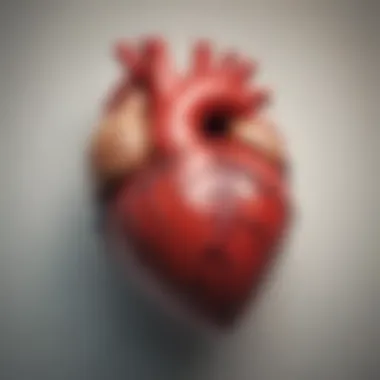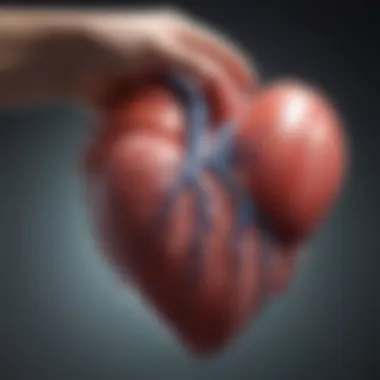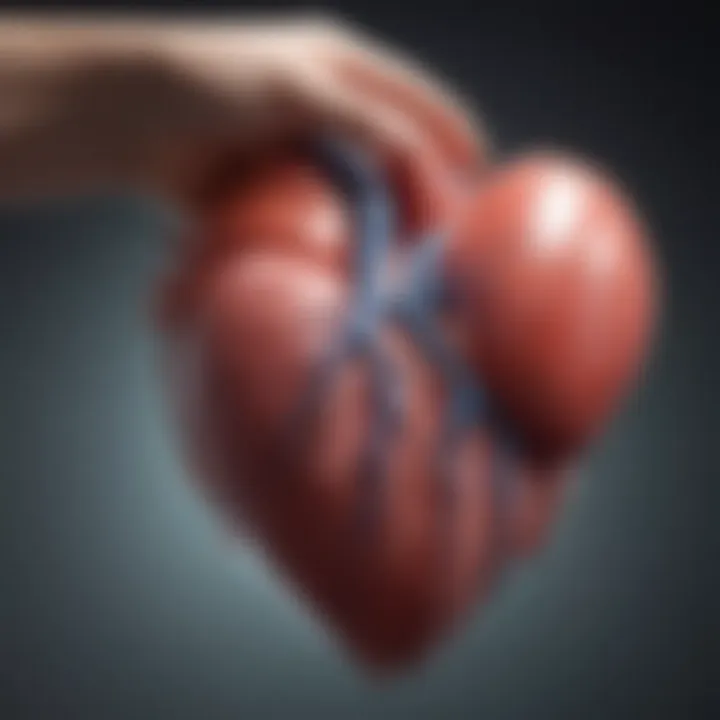Heart to Heart Donation: Dynamics and Implications


Intro
Heart to heart donation represents a critical juncture in both medical practice and ethical discourse. This article explores the multifaceted dimensions associated with the transfer of a heart from one individual to another. At the center of this discussion are not just the biological aspects of organ donation, but also the emotional and ethical underpinnings that shape this complex procedure.
Understanding heart to heart donation requires a thorough examination of various components. These include the criteria determining donor and recipient eligibility, the selection process for recipients, and the care procedures necessary after the transplantation operation. Additionally, the implications for public awareness surrounding organ donation merit attention, particularly in a world where many individuals remain unaware of how various aspects of this process unfold.
It is essential to engage with the medical, ethical, and human elements to gain a holistic perspective on heart transplantation. Offering insights into these aspects will provide a clearer picture for students, researchers, educators, and professionals involved in this ongoing conversation.
Prolusion to Heart to Heart Donation
Heart to heart donation represents a vital practice in the realm of organ transplantation. Understanding this concept is crucial as it encompasses not only the medical procedures involved but also the ethical and emotional implications that affect both donors and recipients. The dynamics of heart donation are complex, requiring meticulous consideration of various factors, including donor eligibility, recipient needs, and the overall impact on society.
The efficiency of the heart transplantation process hinges on both the availability of viable organs and the readiness of medical facilities to perform such surgeries. Heart transplants can provide a new lease on life to those suffering from severe heart conditions. Thus, grasping the nuances of heart to heart donation is essential for medical professionals, policymakers, and the general public alike.
Defining Heart to Heart Donation
Heart to heart donation refers to the surgical procedure where a healthy heart from a donor is transplanted into a recipient whose heart is failing. This exchange of life-saving organs is a profound act that not only addresses the immediate medical needs of the recipient but also reflects the altruism involved in organ donation. The term encapsulates the emotional connection between the donor's selflessness and the recipient's hope for survival.
The process of heart donation involves numerous steps, including identifying potential donors, performing medical evaluations, and ensuring proper surgical procedures are followed. It signifies a moment of profound humanitarian effort and represents a critical aspect of health care that aims to restore life.
Importance of Heart Transplants
The significance of heart transplants cannot be overstated. Every year, thousands of individuals await heart transplants due to various conditions like coronary artery disease or arrhythmias. The scarcity of available organs results in many patients waiting for extended periods, often with deteriorating health.
- Improved Quality of Life: Heart transplants can drastically enhance the quality of life for recipients, allowing them to resume normal activities and enjoy life once again.
- Extended Lifespan: For many, a successful heart transplant can result in years of good health, extending their lifespan significantly compared to remaining on medications or other treatments.
- Addressing Health Disparities: Access to heart transplants can help bridge health disparities experienced by underrepresented communities, although equitable access remains a critical issue.
"Heart transplants are not just medical procedures; they are lifelines that connect donors and recipients in profound ways."
"Heart transplants are not just medical procedures; they are lifelines that connect donors and recipients in profound ways."
The Process of Heart Donation
The process of heart donation is a crucial aspect of organ transplantation, providing lifelines to patients suffering from severe heart diseases. Understanding how this system operates requires a thorough grasp of both the identification of potential donors and the medical evaluations that follow. These foundational elements ensure that hearts are allocated based on need, compatibility, and overall success potential. This part of the article explores the sequential steps necessary to facilitate heart donation and outlines their significance in the broader context of heart transplantation.
Identification of Donors
Identifying potential heart donors is the initial step in the organ transplantation chain. This identification process typically involves medical staff assessing a patient’s clinical condition. Patients primarily undergo evaluations in hospitals, often intensive care units, after experiencing severe cardiac events. Key indicators for potential donation include:
- Diagnosis of irreversible brain death.
- Absence of significant comorbidities that could affect organ viability.
- Medical history that aligns with rigorous transplantation criteria.
During this phase, healthcare professionals work diligently to ensure candidates for donation are suitable. Organizations such as the United Network for Organ Sharing (UNOS) play a vital role in solidifying this process. Their protocols help manage waitlists, ensuring timely referrals of potential donors while prioritizing ethical standards.
Once a donor is identified, the next steps involve medical evaluations to ascertain organ readiness.
Medical Evaluation for Donation
The medical evaluation process is essential to determine whether a donor's heart is viable for transplantation. This evaluation assesses various medical and logistical factors that can influence the success of the transplant. Factors include:
- Half-life of the organ: The duration between the removal of the heart and its implantation in the recipient.
- Organ compatibility: Type matching between the donor's heart and the recipient’s blood type and other immunological responses.
- Overall health assessments: Determining if the donor's lifestyle has impacted the quality of the heart, including any history of heart disease or infections.
Following this, transplant coordinators will conduct a comprehensive review of the donor's medical history. Special tests may be performed, including imaging studies and laboratory tests, to confirm the heart's condition. This careful analysis promotes optimal outcomes post-surgery, minimizing complications for the recipient.
"The success of organ transplantation hinges on thorough donor identification and medical evaluation processes, underscoring the foundation of life-saving surgery."


"The success of organ transplantation hinges on thorough donor identification and medical evaluation processes, underscoring the foundation of life-saving surgery."
Through diligent execution of these processes, the field of heart transplants continues to evolve, positively impacting countless lives.
The Recipient Selection Process
The recipient selection process is a critical component in heart transplantation, influencing both the success of the procedure and the long-term health outcomes for recipients. Identifying the right candidates for heart donation involves a thoughtful analysis of various factors, ensuring that recipients are not only suitable from a medical standpoint but also positioned to benefit most from such a life-altering procedure. This section will elaborate on the key elements of recipient eligibility criteria and the complexities involved in matching donors with the appropriate recipients.
Criteria for Recipient Eligibility
A set of strict criteria governs the selection of candidates for heart transplantation. The main aim is to ensure that those receiving the organ have a higher likelihood of positive outcomes. Key components of these criteria include:
- Medical Stability: Recipients must be stable enough to undergo the surgery. This includes having manageable coexisting conditions and a solid baseline health status.
- Age Considerations: While age in itself is not a rigid disqualifying factor, most centers prefer candidates within a specific age range due to the higher likelihood of successful outcomes in younger patients.
- Psychosocial Evaluation: Emotional and psychological readiness is crucial. Recipients must demonstrate the ability to follow post-operative care instructions, which can be complex and demanding.
- Absence of Active Infections: Candidates must be free from any active infections that can complicate surgery or recovery.
- Substance Use History: Active substance abuse can lead to high risks during and after transplant surgery.
These factors work together to create a comprehensive assessment that prioritizes patient outcomes. Many transplant centers require recipients to be assessed by a multidisciplinary team, including cardiologists, surgeons, psychologists, and social workers, to ensure that no critical factors go overlooked.
Matching Donors with Recipients
Once recipients are identified, the next significant step is matching them with available donors. This is where the complexities of human biology come into play. The aim is to find the best possible fit, maximizing compatibility to improve transplant success rates. Some primary considerations during this matching process include:
- Blood Type Compatibility: The ABO blood group system is a fundamental aspect of compatibility. Recipients are matched according to their blood types to prevent rejection of the organ.
- Body Size and Organ Size: It is essential that the donor heart suits the recipient’s body size. An organ that is too large or too small can lead to complications post-transplant.
- Geographic Location: Proximity to the donor organ's location can impact recipient health and outcomes. The quicker a recipient receives a transplant, the better their chances of a successful recovery.
- Time on Waiting List: Those who have been on the waiting list longest often receive priority, as their medical condition may be deteriorating.
The success of the transplant is often dictated by how well the donor organ matches the recipient's unique physiological profile.
The success of the transplant is often dictated by how well the donor organ matches the recipient's unique physiological profile.
Medical Considerations and Risks
The topic of medical considerations and risks is crucial to understanding heart to heart donation. The entire process involves significant clinical procedures, which come with various potentials for positive outcomes as well as complications. Knowing these elements helps in setting realistic expectations for both donors and recipients. A thorough examination of medical techniques and post-operative care enhances the overall success rates of heart transplants.
Surgical Techniques in Heart Transplantation
Surgical techniques in heart transplantation have evolved considerably over the years. Surgeons typically utilize a procedure called orthotopic heart transplantation, where the diseased heart is removed and replaced with a healthier donor heart. This surgery is often performed under general anesthesia. The surgical team must connect the new heart to the patient’s existing blood vessels, which requires precision and skill. Additionally, minimally invasive techniques are gaining traction. They reduce recovery time and surgical trauma, allowing recipients to heal more quickly. Understanding these techniques is vital for medical professionals and enhances the trust patients place in the process.
Post-Operative Care for Recipients
Post-operative care after heart transplantation plays a significant role in long-term survival rates of recipients. Typically, recipients will require monitoring for several days in the hospital. This includes regular checks on heart function and vital signs. After discharge, they need to follow a strict medication regimen to prevent organ rejection. Immunosuppressants are crucial but can lead to side effects, making medical supervision essential. Regular follow-up appointments are critical, as they ensure recipients are adapting well to their new heart and help identify any potential issues early on. Educating recipients about lifestyle modifications is also part of post-operative care, as habits can significantly impact health outcomes.
Potential Complications Post-Transplant
Complications can arise after a heart transplant, making it necessary for patients to stay vigilant. One major issue is transplant rejection, which occurs when the recipient's immune system identifies the donor heart as foreign and attacks it. This can be acute or chronic, and monitoring is essential. Other potential complications include infections and cardiovascular issues. Recipients may also experience kidney problems, especially due to the effects of immunosuppressive drugs. These risks necessitate a comprehensive understanding of the implications involved in heart to heart donation. Awareness and preparation can significantly influence recovery and quality of life.
"Understanding the medical considerations and risks associated with heart transplantation is imperative for both donors and recipients to navigate this complex process effectively."
"Understanding the medical considerations and risks associated with heart transplantation is imperative for both donors and recipients to navigate this complex process effectively."
In summary, a deep dive into surgical techniques, post-operative care, and potential complications reveals a complex but crucial landscape where medical considerations dictate not just the outcome, but the broader implications for recipients. Ensuring this knowledge is disseminated can help foster a well-informed community regarding heart to heart donation.
Ethical Considerations in Heart Donation
The ethical aspects of heart donation are critical to understanding the broader implications of this practice. Heart donation involves complex moral decisions that impact donors, recipients, and society as a whole. These considerations stem from the fundamental, intertwining themes of consent, autonomy, and equity in access to transplantation.
Engaging with ethical questions helps to clarify the responsibilities of medical professionals, the rights of patients, and the societal duty to ensure fair access to life-saving resources. In particular, dissecting these elements may promote trust in the medical system and enhance participation in organ donation programs.
Consent and Autonomy in Donation


Consent is a pivotal element in the heart donation process. Medical ethics dictate that individuals have the right to make informed decisions about their own bodies. This principle of autonomy affirms that potential donors or their families must willingly provide consent for the donation without coercion.
Key points regarding consent include:
- Informed Decision-Making: Individuals must be educated about the donation process. This includes understanding the implications of becoming a donor, potential health risks, and the impact of their decision on others.
- Transparency: Healthcare providers are responsible for ensuring that all information regarding the donation process is clear and accessible. Without transparency, individuals may feel misled or pressured into decision-making.
- Respect for Wishes: Respecting the preferences of both living donors and families of deceased donors is essential. Their decisions should be the guiding factor within the donation framework.
The emphasis on consent also extends to the procedures surrounding heart transplantation. It is crucial to engage families meaningfully and sensitively, allowing them to voice any concerns or queries they may have.
Equity in Access to Transplants
The principle of equity demands that every individual, regardless of background, should have a fair chance at receiving a heart transplant. However, systemic inequalities can create disparities. Significant factors influencing equitable access to transplants include:
- Socioeconomic Status: Individuals from lower socioeconomic backgrounds may face barriers in accessing healthcare services and information about organ donation.
- Geographic Disparities: Access to transplant centers can vary significantly depending on location, which may disadvantage certain populations.
- Policy and Legislation: Policies governing transplantation can unwittingly favor specific groups, creating an imbalance in resource distribution.
Ensuring equity is not just a moral obligation but a critical component to enhancing the overall success of heart donation programs. Initiatives aimed at fostering awareness and education can play a transformative role in leveling the playing field and promoting diversity among recipients.
The importance of ethical considerations in heart donation cannot be overstated. They foster trust between healthcare providers and communities, ensuring that every individual has access to potentially life-saving procedures.
The importance of ethical considerations in heart donation cannot be overstated. They foster trust between healthcare providers and communities, ensuring that every individual has access to potentially life-saving procedures.
Emotional Implications for Donors and Recipients
The emotional landscape surrounding heart donation is complex and multifaceted. Understanding these dynamics is critical not only for the emotional well-being of both donors and recipients but also for the broader acceptance of organ transplantation. Individuals involved in the donation process often experience a wide array of feelings related to grief, hope, guilt, and gratitude. An in-depth exploration of these psychological factors can reveal insights into how donations impact lives beyond the physical act of transplanting a heart.
Psychological Effects on Recipients
For recipients of heart transplants, the journey is often characterized by a profound emotional transformation. The notion of receiving a heart that once belonged to another person can stir deep feelings of appreciation and responsibility. Recipients may feel an overwhelming sense of gratitude towards the donor's family, as well as a sense of guilt for being alive when the donor had passed. This unique emotional complexity can lead to a range of psychological outcomes.
Research indicates that many recipients experience heightened anxiety levels post-transplant. This anxiety can stem from fears about the transplanted organ's acceptance by their body or potential complications from surgery. Effective coping strategies include counseling and support groups, allowing recipients to share their experiences and feelings with others who understand their journey.
In addition to anxiety, some recipients deal with survivor’s guilt. They often wonder why they were chosen to receive a second chance at life while others may not have that opportunity. These emotions can lead to a sense of disconnect from their previously established identity. It becomes essential for medical professionals and support systems to address these psychological effects comprehensively, ensuring that recipients are not only physically healed but also emotionally supported throughout their recovery.
Support for Donor Families
Donor families play a crucial role in the donation process. Their emotions post-donation can range from pain to a sense of peace and purpose. The act of donating a loved one's heart can be a way to honor their memory, but it can also evoke intense feelings of loss.
Counseling services provide vital support for donor families as they navigate this difficult time. Programs often emphasize the importance of communication within the family unit, helping members articulate their grief and find comfort in shared experiences. Families may also benefit from learning about the positive impact their loved one’s donation has had on another person's life. This awareness can alleviate feelings of despair and replace them with a sense of pride.
Support groups can also foster a community where donor families feel understood and valued. These gatherings create a space for sharing stories, encouraging healing through collective experiences. Furthermore, engaging with recipients may offer donor families a unique perspective on how their loved one’s gift has transformed another's life.
In summary, the emotional implications of heart donation extend far beyond medical procedures. Addressing psychological effects and focusing on support systems for both donors and recipients is fundamental to ensuring a holistic experience in the realm of organ transplantation. Their intertwined emotions form a foundation for resilience and hope in the face of loss.
In summary, the emotional implications of heart donation extend far beyond medical procedures. Addressing psychological effects and focusing on support systems for both donors and recipients is fundamental to ensuring a holistic experience in the realm of organ transplantation. Their intertwined emotions form a foundation for resilience and hope in the face of loss.
Awareness and Education on Heart Donation
In the realm of organ transplantation, awareness and education play a vital role in shaping public understanding and attitudes toward heart donation. This section emphasizes the significance of promoting knowledge and debunking myths surrounding heart to heart donation, which can significantly influence the number of donors and ultimately save lives. Enhancing awareness directly aligns with the objective of increasing donor registrations and encourages conversations about this crucial health issue.
Promoting Organ Donation Awareness
Raising awareness about organ donation is essential for encouraging participation in heart donation programs. Many individuals face confusion and fear when considering donating their organs, often stemming from a lack of knowledge. Educational campaigns help disseminate important information about the heart donation process, what is involved, and the life-changing impacts it has on recipients. A foundational aspect is understanding the criteria for becoming a donor and the procedure that follows donation.
Some key components of promoting organ donation awareness include:


- Community Engagement: Initiating community events, workshops, and seminars can create platforms for dialogue.
- Use of Social Media: Leveraging platforms like Facebook and Reddit can disseminate real-time information and foster open discussions.
- Partnerships with Local Organizations: Collaborating with health organizations can amplify outreach efforts.
By fostering a culture that values organ donation, we can combat the shortage of hearts available for transplant. This requires a dedicated and supportive approach to engage potential donors and their families.
Addressing Myths about Heart Donation
Myths surrounding heart donation often hinder willingness to participate. Misinformation can lead to misconceptions that discourage individuals from becoming donors. Addressing these myths is crucial in promoting heart donation awareness. Some common myths include the belief that:
- Doctors Won't Try to Save Me: Many people think if they are registered as donors, medical professionals won't prioritize their care. In reality, the hospital staff is required to do everything possible to save a patient first.
- Organ Donation is Painful: Potential donors sometimes fear that the donation process involves suffering. In reality, the process is conducted with the utmost care under anesthesia for the donor, who is often a person who has passed away.
- Religious Objections: There are many misconceptions about religious beliefs regarding organ donation. In fact, many religious groups support and encourage it as a noble act of kindness.
"Addressing these misconceptions can enhance the willingness to donate, thus contributing to the greater good of society."
"Addressing these misconceptions can enhance the willingness to donate, thus contributing to the greater good of society."
Tackling these myths through factual information is crucial. Educational resources, workshops, and discussions can demystify the process and promote informed decision-making regarding heart donation.
Future of Heart Transplantation
The future of heart transplantation is a critical area of focus within the realm of medical advancements. As the demand for heart transplants continues to rise, understanding the evolution in this field becomes increasingly important. This section will delve into the significant elements related to innovations in organ transplantation and the role of artificial hearts.
Innovations in Organ Transplantation
Innovations play an essential role in enhancing the efficacy and efficiency of heart transplantation. Several developments show promise in addressing the limitations currently faced. These include:
- Improved Preservation Techniques: New methods for organ preservation are significant. The development of hypothermic machine perfusion allows for better nutrient delivery and oxygenation of the donor heart, extending its viability outside the body.
- Expanded Donor Criteria: Utilizing a broader range of donor hearts, including those from marginal donors, can potentially increase the donor pool. Studies indicate that with proper screening, these hearts can be successfully transplanted.
- 3D Bioprinting: The notion of creating personalized heart tissue using 3D printing technology presents exciting possibilities. This method could one day lead to the ability to replace damaged sections of the heart with bioprinted tissues, thus lowering the demand for whole organ transplants.
- Immunotherapy: This approach seeks to minimize rejection rates through advanced drugs that aim to modulate the immune response. Such therapies could lead to better transplant outcomes by allowing recipients to tolerate the new organ with fewer complications.
Innovations not only promise to enhance transplant success rates but may also lead to more accessible options for patients waiting for a heart transplant.
The Role of Artificial Hearts
Artificial hearts are emerging as a viable solution for patients facing end-stage heart failure. Their role in the future of heart transplantation is multifaceted:
- Bridge to Transplant: Many patients receive mechanical circulatory support while awaiting a transplant. Devices like the Total Artificial Heart can stabilize patients, making them suitable candidates for transplantation.
- Destination Therapy: In some cases, artificial hearts can serve as a permanent solution for patients who are ineligible for transplantation. These devices help sustain quality of life when a transplant is not an option.
- Research and Development: Continuous advancements in engineering artificial hearts enable them to mimic the natural heart’s functions more effectively. Biocompatibility and longer-lasting materials are being developed to enhance patient outcomes.
Future enhancements in artificial heart technology aim to reduce complications and improve the integration of these devices into patients’ lives.
"The integration of artificial hearts alongside traditional transplantation maintains hope for those facing life-threatening heart conditions."
"The integration of artificial hearts alongside traditional transplantation maintains hope for those facing life-threatening heart conditions."
These points highlight how the future of heart transplantation is intertwined with technological progress. As innovations and artificial hearts advance, the potential to save and improve lives increases significantly. The continued exploration in these areas is paramount for optimizing heart transplant outcomes.
Epilogue
The conclusion of the article serves as a critical reflection on the topic of heart to heart donation. This segment wraps up the extensive discussion on the medical, ethical, and emotional dynamics inherent in heart transplants. Recognizing the significance of the topic encourages a deeper understanding among students, researchers, educators, and healthcare professionals.
Summarizing Key Insights
Throughout the article, several key insights have emerged regarding heart to heart donation:
- Medical Processes: The article highlights the meticulous procedures involved in organ donation, including donor identification and recipient selection criteria.
- Ethical Framework: Ethical dimensions such as consent, autonomy, and equitable access to transplants are examined and underscored.
- Emotional Impact: The psychological effects experienced by both donors’ families and recipients are pronounced. Awareness initiatives can mitigate the emotional toll associated with donation.
- Future Directions: Innovations like artificial hearts and advancements in transplantation methods are showing promise, paving a path for future developments in heart surgeries.
These elements emphasize the complexity of heart transplantation, revealing a web of interrelated considerations that must be understood and navigated.
The Path Forward for Heart to Heart Donation
Looking ahead, several considerations can shape the future of heart to heart donation:
- Education and Awareness: Continuing to raise awareness about organ donation is crucial. Engaging campaigns can demystify myths and promote the benefits of organ transplantation.
- Policy Improvements: Legislative framework can enhance consent processes, making them more comprehensible and accessible. Changes in policy might promote equity in organ distribution.
- Research and Technology: Support for ongoing research into transplantation techniques and artificial organ development can increase success rates and accessibility in the transplantations.
In summary, heart to heart donation holds significant implications for healthcare, ethics, and society. Emphasizing the benefits of both donating and receiving hearts can foster a more supportive atmosphere for organ transplantation, encouraging individuals to consider participating in this critical life-saving process.



